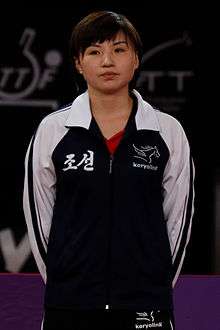Kim Jong
Kim Jong (a Korean romanization of the Korean 김정, also spelled Gim Jeong or Kim Jung in South Korea) may refer to:
See also

Kim Jong (table tennis)
Kim Jong (born 19 April 1989) is a North Korean table tennis player. She competed for North Korea at the 2012 Summer Olympics. She won gold medals in mixed doubles events with Kim Hyok-bong at the 2013 World Championships and the 2014 Asian Games.
Kim represents the April 25 Sports Team.
References

Kim Jong-il
Kim Jong-il (Korean pronunciation: [ɡ̊imd͜zɔŋil]; 16 February 1941/1942 – 17 December 2011) was the supreme leader of the Democratic People's Republic of Korea (DPRK), commonly referred to as North Korea, from 1994 to 2011. By the early 1980s Kim had become the heir apparent for the leadership of the country and assumed important posts in the party and army organs. He succeeded his father and founder of the DPRK, Kim Il-sung, following the elder Kim's death in 1994. Kim Jong-il was the General Secretary of the Workers' Party of Korea (WPK), Chairman of the National Defence Commission (NDC) of North Korea, and the Supreme Commander of the Korean People's Army (KPA), the fourth-largest standing army in the world. Kim's leadership is thought to have been even more dictatorial than his father's.
During Kim's regime the country suffered from famine, partially due to economic mismanagement, and had a poor human rights record. Kim involved his country in state terrorism and strengthened the role of the military by his Songun, or "military-first", politics. Kim's rule also saw tentative economic reforms, including the opening of the Kaesong Industrial Park in 2003.
Kim Jong-hak
Kim Jong-hak (November 5, 1951 – July 23, 2013) was a South Korean television director and producer, best known for the seminal and highly rated Korean dramas Eyes of Dawn (1991) and Sandglass (1995). After financial losses incurred by the big-budget fantasy series The Legend (2007) and Faith (2012), Kim was under investigation when he committed suicide in 2013.
Career
Beginnings
Kim Jong-hak was born on November 5, 1951 in Jecheon, North Chungcheong Province, the fourth son of seven siblings. While attending Hwimun High School, he won an Excellence Award at the National High School Theater Competition in 1966.
MBC training
After he graduated from Kyung Hee University with a Journalism degree, he joined the broadcasting network MBC in 1977. This was a period when the South Korean television industry was undergoing a creative transition with the launch of color broadcasts and ENG cameras, and the new format of short dramas adapted from famous novels, MBC's Bestseller Theater (베스트셀러극장). Like most newbie production directors (called by the title "PD" in Korea), Kim slowly climbed up the ranks by assisting veterans, getting the occasional producer credit on Chief Inspector (수사반장), the 1981 landmark police procedural starring Choi Bool-am.
Podcasts:

